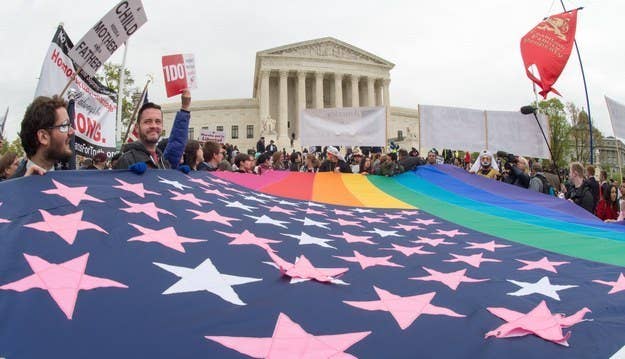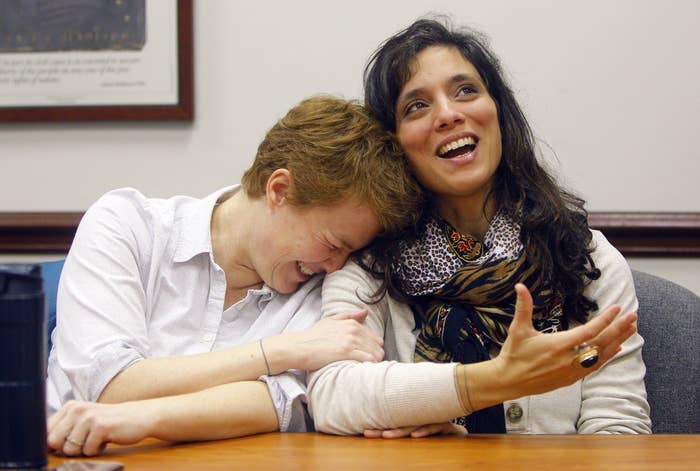
WASHINGTON — On Tuesday, the Supreme Court will hear two-and-a-half hours of arguments about two questions. They're simple and direct:
1. Does the U.S. Constitution's Fourteenth Amendment require states to license a marriage between two people of the same sex?
2. Does the U.S. Constitution's Fourteenth Amendment require states to recognize the marriage between two people of the same sex when their marriage was lawfully licensed and performed elsewhere?
It's pretty straight-forward. And yet: More than 150 briefs have been filed with the justices, including the ones from the parties to the cases — state officials from Kentucky, Michigan, Ohio, or Tennessee and people challenging marriage or marriage recognition bans in each of those states.
But most of the briefs are amicus curiae, or friend of the court, briefs — arguments made by people and groups not directly involved in the case but have an interest in the outcome and believe they have information of value or a viewpoint of interest to the court on the issues. There were 78 amicus briefs filed in support of the same-sex couples — including one filed by the Obama administration. And 67 amicus briefs were filed in support of the states — including one by the U.S. Conference of Catholic Bishops.
The briefs offer a window into all the reasons that anyone could possibly argue for legalized marriage for same-sex couples — and against them. The parties' briefs and the Obama administration's brief, however, will be the only ones with a voice at the court on Tuesday — with 90 minutes of arguments to be held on the first question and 60 minutes set aside for the second question.
Mary Bonauto from Gay & Lesbian Advocates & Defenders (profiled by BuzzFeed News in 2013) will lead off the arguments in favor of marriage equality for 30 minutes, followed by 15 minutes from Solicitor General Donald Verrilli Jr. Then, John Bursch, Michigan's former solicitor general, will argue in defense of marriage bans for 45 minutes. Bonauto will then give a brief rebuttal.
Doug Hallward-Driemeier (interviewed by BuzzFeed News earlier this year) will lead of about 30 minutes of arguments on the recognition question, and Joseph Whalen from the Tennessee Attorney General's Office will defend the recognition bans for 30 minutes. Finally, Hallward-Driemeier will give a brief rebuttal.
And while the justices are free to ask whatever questions they want, here are the main legal issues laid out for argument.

It sounds simple in practice — "Should same-sex couples be able to marry? Here are some reasons why or why not!" — but the legal issues the court is facing quickly get complex.
The parties are raising challenges to the ban under two constitutional provisions of the Fourteenth Amendment: equal protection and "fundamental rights" protections.
When the Supreme Court hears cases about the Equal Protection Clause of the Constitution, the justices generally examine laws under the "rational basis" standard. Basically, for a law to be upheld, the government must show that the law is "rationally related" to a legitimate state interest. This is a relatively simple question — is there a legitimate reason for the law? — and is an easier, lower standard to meet.
In other words: The most basic question to be argued at the Supreme Court on Tuesday is whether the marriage and marriage recognition bans are, in effect, arbitrary.
In these cases, here are the reasons and goals that the states have put forth as legitimate reasons to limit marriage and marriage recognition to opposite-sex couples:
1. The democratic process needs to be respected (voters put the marriage ban in place)
2. Federalism (the U.S. government should respect the states' decisions in the area of family law)
3. "Responsible procreation" (the government should ensure that the people who can "accidentally" procreate — i.e. not same-sex couples — will be encouraged to have stable relationships)
4. Biology, because same-sex couples can't procreate naturally ("Biology alone, therefore, provides a rational explanation for not expanding marriage to add same-sex couples," Tennessee officials argue)
5. Promoting households with a mother and a father (Michigan officials argue changing the legal definition of marriage could have a long-term consequence of "[undermining marriage] in the long term as an institution for linking parents to their biological children.")
6. Promoting higher birth rates (the "ensuring the future of the human race" argument only comes directly from Kentucky, among the sates)
7. Caution (states should be able to see what the effect of letting same-sex couples marry is before acting)
And while the plaintiffs argue that the marriage bans are unconstitutional under rational basis — in other words, that those are not legitimate government objectives or that they are not rationally related to the bans — the plaintiffs also believe that proving there is a rational basis for the bans shouldn't be enough.

Sometimes courts apply a higher level of "scrutiny" in equal protection cases because the laws classify people on a basis that the court has said is legally questionable (race or sex, for instance).
If some level of "heightened scrutiny" applies, the government has to show more than just a legitimate reason for such laws.
There are different levels of scrutiny, and each requires a higher showing for a law to be upheld. Under the most stringent, "strict scrutiny" test, for example, the law must be the least restrictive means of advancing a compelling state interest. How much scrutiny the Supreme Court will apply to the marriage bans is a matter of significant debate.
In its three big "gay rights" cases over the past 20 years, the Supreme Court has not declared explicitly whether some level of heightened scrutiny applies to sexual orientation cases. LGBT legal organizations — and many of the plaintiffs before the Supreme Court — have argued for a long time that some form of heightened scrutiny should apply to sexual orientation-based classifications like the marriage bans. The Obama administration joined that cause in 2011.
As the Justice Department lays out in its brief to the justices, the four areas the court traditionally looks at when determining if heightened scrutiny applies are whether: the group has faced a history of discrimination, the characteristic that defines the group does not affect a person's ability to contribute to society, the trait in question is immutable or "a defining characteristic," and the group faces political powerlessness.
In its brief before the justices — which will be followed up with 15 minutes of argument time Tuesday — the Justice Department argues that heightened scrutiny should apply here because "[a]ll four factors are present in the case of sexual orientation."
The states argue, variously, that certain factors — most notably, the political powerless area — suggest that sexual orientation classifications shouldn't be viewed with heightened scrutiny. Going further than that, some states argue the marriage bans don't even discriminate on the basis of sexual orientation. Michigan officials, for examples, argue, "Michigan's marriage laws are based on biological complementarity, not sexual orientation."
Even if there isn't heightened scrutiny applied in theses cases, however, the plaintiffs also point to prior Supreme Court language about "careful consideration" to be given when examining some laws.
Finally, under the Supreme Court's trio of "gay rights" cases, many people have argued that Justice Anthony Kennedy — who wrote all three majority opinions in those cases — has advanced, at the least, arguments for examining certain types of laws with a closer look than rational basis — even if not formally using the language of "heightened scrutiny."
Kennedy's "animus" doctrine has been discussed in several of the briefs, including, most extensively, in the Human Rights Campaign's "People's Brief" — written by Roberta Kaplan, Edith Windsor's lawyer in the DOMA case, and two law professors, Dale Carpenter and Steve Sanders.
They argue that, under the principles Kennedy has laid out, most recently in Windsor's case, that "there is more than sufficient basis for this Court to conclude that the design, purpose, and effect of the laws at issue in Kentucky, Michigan, Ohio, and Tennessee are 'not to further a proper legislative end but to make [gay people] unequal to everyone else.'"
In addition to their sexual orientation discrimination arguments, the plaintiffs in these cases also raise other equal protection issues:
1. Discrimination on the basis of gender (whether it is unfair to block women from marrying other women and vice versa)
2. Illegitimacy (whether state marriage bans punish illegitimate children)
Regarding the sex discrimination claim — which was the basis of the original 1990s lawsuit for same-sex couples' marriage in Hawaii in the 1990s — one of the judges of the 9th Circuit Court of Appeals this past fall already detailed how the bans classify people based on sex: "Only women may marry men, and only men may marry women." In addition to pointing that out, the lawyers for the Kentucky plaintiffs argue that marriage bans "rely on 'stereotypes' about the relative capabilities of men and women like those that this Court has repeatedly rejected" as unconstitutional.
The illegitimacy claim has been raised in Michigan — which began as an adoption case. There, the plaintiffs argue that the state's marriage ban places an "onerous" burden on children raised by same-sex couples because Michigan, which bans same-sex couples from marrying, only allows married couples to jointly adopt.

The second major constitutional area the justices will consider is the issue of "fundamental rights" — protected by the Due Process Clause — and whether marriage bans limit exercise of such a fundamental right.
The primary argument by same-sex couples — laid out repeatedly by Ted Olson in his assault on California's Proposition 8 — is that the Supreme Court has on more than a dozen occasions called marriage a fundamental right. Excluding same-sex couples from marriage subjects that exclusion to strict scrutiny.
Lawyers for the Michigan same-sex couple argue that the Supreme Court's earlier cases striking down sodomy laws and the Defense of Marriage Act were, in fact, based on "includ[ing] gay people within our laws and tradition" of giving constitutional protection to decisions about marriage and relationships.
"Whatever limits may be imposed on the right to marry, the gender of the partners cannot be one of them," they write.
Lawyers for the states counter that the plaintiffs are seeking a right to "same-sex marriage" — which they state is not rooted in the country's history or traditions — not marriage.
The states argue that same-sex couples aren't seeking to end exclusion from marriage. They counter that same-sex couples are, instead, asking for something new — "same-sex marriage" — to be considered a "fundamental right."
And while this sounds like an Alice in Wonderland debate — and it, in some ways, is — the underlying argument matters to the court: Is this a new right or is this the same right that the court has been talking about for decades and decades?
The states, of course, argue that this is something new. "The petitioners seek something quite different here: a due-process right to an expanded definition of marriage they prefer — the right of two consenting partners to marry regardless of 'the gender of the partners,'" Michigan officials argue. This, they go on, "is simply the right to same-sex marriage by another name."

While a ruling striking down the marriage bans under any of those reasons also would mean the recognition bans are unconstitutional, the final hour of Tuesday's arguments will include additional arguments specific to the recognition bans.
The recognition bans, lawyers for same-sex couples argue, would be unconstitutional under the equal protection and fundamental rights arguments put up against the marriage bans. Additionally, though, the lawyers point to four additional reasons why the recognition bans should be found to be unconstitutional:
1. They infringe upon the fundamental right to remain married.
2. They infringe upon fundamental right to travel.
3. They violate equal protection rights because they deviate from states' general practices.
4. They violate equal protection rights because they deny married same-sex couples equal dignity.
The states counter that several other constitutional principles — including federalism, state sovereignty, and the "public policy exception" to the Full Faith and Credit Clause — provide states with ample backing for their decision not to recognize marriages of same-sex couples that were granted elsewhere.
The primary response — exemplified in Ohio's brief — is to note that it was New York's decision to recognize same-sex couples' marriages that was being respected in the Windsor decision. That decision, states argue, should continue to be respected even when states decide not to extend marriage to same-sex couples.
